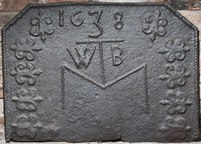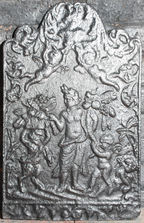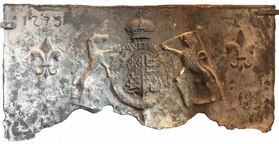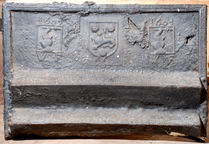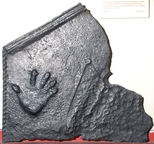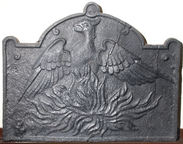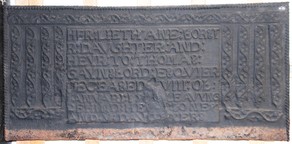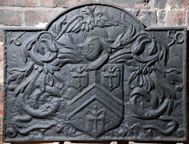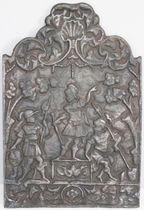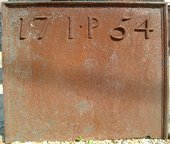-
1242
Description: Canted rectangular shape; twisted rope edging (top and sides); top centre, date, 1638, with uneven figures (oversize 3), between two fleurs-de-lys; four fleurs-de-lys, lying horizontally, down each side; below date, slender 'T' shape above a slender 'M' shape, with initials 'W' and 'B' separated by the 'T' shape.
Notes: The distinctive fleur-de-lys has not been noted on any other fireback. Purchased by Birmingham Museums in 1982 at the sale of the contents of the house ‘Hildercroft’ on Highfield Road in Hall Green, Birmingham.
Inscription: 1638 / W T B / M
- Decoration tags:
- rectangular with canted top corners (shape)
- rope (edging)
- simple stamps
- carved stamps
- heraldic
- text
- objects
Manufactured: in 1638 in England.
Current location: Blakesley Hall, Blakesley Road, Yardley, West Midlands, England.
(part of the Birmingham Museums Trust museum group)
- Attached to series:
- Miscellaneous stamp firebacks
- Fleur-de-lys firebacks
-
26
Description: Quasi-arched rectangular shape with swirled and draped foliage across the top; fillet edging with bottom panel containing indistinct floral scrolls; figure of Plenty/Abundance holding a bunch of fruit, accompanied on her left by a cherub, and receiving a further bunch of fruit from a faun to her right; two cherubs hold foliage aloft.
Notes: The figure of Plenty is one of the representations in the Iconologia, published in the early 17th century by Cesare Ripa, and subsequently in other editions. They frequently form the subject of firebacks.
Copies of this fireback are known.
- Decoration tags:
- rectangular with round arch (shape)
- fillet (edging)
- whole carved pattern
- pictorial
- allegorical
- humans
Manufactured: in the early-18th century in England.
Current location: Bateman's, Burwash, East Sussex, England.
Museum number: 761087 (part of the National Trust museum group)
- Attached to series:
- Late pictorial series (all)
-
1226
Description: Rectangular; rope edging (top & sides); in centre, Tudor shield, garter, crown and supporters (greyhound and lion) between two fleurs-de-lys; date top left.
Notes: A badly corroded fireback. The armorial achievement is seen on other firebacks and was formed from four separate stamps; the supporters are consistent with the date; the style of the numerals is uncharacteristic of the period. The sharpness of the detail on the crown and upper part of the Garter indicates that the fireback is contemporary with the date, and not older as similar examples seem to be. The same date in identical form is on a similar fireback at Penshurst Place, Kent (no. 515).
Inscription: 1579 / [Garter motto incomplete]
Arms: Tudor royal (prob. Elizabeth I)
- Decoration tags:
- rectangular (shape)
- rope (edging)
- carved stamps
- date stamp
- heraldic
- armorial
- text
- animals
Manufactured: in the late-16th century in the Weald area of England.
Current location: Groombridge Place, Speldhurst, Kent, England.
-
179
Description: Rectangular; double fillet moulded edging; top centre, on a rectangular block, shield of the arms of the Fowle family - (Gules) a lion passant guardant between three roses (Or); on each side, two rectangles, each containing a helm and the crest of the Fowles - an Arm in armour holding a Battle axe issuant from a Ducal Coronet, above each being the date, 1603, and below each the initials, WF. Across the lower half of the fireback are two solid triangular prisms of iron.
Notes: The stamps relate to William Fowle (1568-1634), ironmaster of Riverhall furnace. The shield stamp also appears on grave slabs in Wadhurst and Frant churches and on an unprovenanced graveslab in Maidstone Museum. The iron prisms were included, perhaps, to retain heat and to prevent the fireback from cracking. Formerly part of the Ade Collection (from Grove Hill, Hellingly, Sussex).
Inscription: 1603 WF [twice]
Arms: William Fowle, of Frant and Wadhurst
- Decoration tags:
- rectangular (shape)
- double fillet (edging)
- carved stamps
- heraldic
- armorial
- text
Manufactured: in 1603 probably at Riverhall Furnace, Wadhurst in the Weald area of England.
Current location: Hastings Museum and Art Gallery, John's Place, Bohemia Road, Hastings, East Sussex, England.
Museum number: HASMG: 1952.51.59 (part of the Hastings Museum museum group)
- Attached to series:
- Fowle series
-
370
Description: Fragment; left side only; twisted rope edging to left, canted moulded batten above; left hand print with dividers to its right.
Notes: An unusual combination of edging. The dividers may refer to the occupation of the person for whom this fireback was cast. Formerly in the collection of Dr C. L. Prince of Crowborough, Sussex.
- Decoration tags:
- rectangular with canted top corners (shape)
- rope and wood moulding (edging)
- simple stamps
- humans
- objects
Manufactured: in the mid- to late-16th century in the Weald area of England.
Current location: Anne of Cleves House, Southover High Street, Lewes, East Sussex, England.
Museum number: LH000.798 (part of the Sussex Archaeological Society museum group)
Citation: Anon., 30 Dec 1911, 'Sussex Backs and their Story', The Ironmonger.
Citation: Dawson, C., 1903, 'Sussex Iron Work and Pottery', Sussex Archaeological Collections, 46, pp. 1-54.
Citation: Gardner, J. S., 1898, 'Iron Casting in the Weald', Archaeologia, 56, 1, pp. 133-164.
- Attached to series:
- Hand print firebacks
- Metalware stamp firebacks
-
409
Description: Quasi-arched rectangular shape, semi-circular protrusions on top corners; circular loop at top of arch; fillet edging with small twists inside arch, and curls inside and below top corners; a phoenix in flames, its wings displayed and inverted.
Notes: The use of the loop in the edging draws comparisons with other firebacks, and may indicate the same source. Formerly part of the J. H. Every collection.
- Decoration tags:
- rectangular with round arch (shape)
- fillet (edging)
- whole carved pattern
- planklines
- pictorial
- mythological
- animals
Manufactured: in the mid- to late-17th century possibly in the Weald area of England.
Current location: Anne of Cleves House, Southover High Street, Lewes, e, England.
Museum number: 1944.24.061 (part of the Sussex Archaeological Society museum group)
- Attached to series:
- Loop edged firebacks
- Phoenix firebacks
-
431
Description: Rectangular; twisted rope edging (top and sides); undulating vine strip repeated in a line four times along the top, and four times vertically on each side of central inscription panel, with shorter vine strip repeated below vertical strips on each side.
Notes: One of several firebacks that re-use the memorial inscription to 'Ane Forster' (Anne Foster) of Crowhurst, Surrey. The vine strip stamp is seen on other firebacks. The excrescence obscuring part of the text was probably the result of clumsy pouring of the iron during casting which displaced some of the sand mould.
Inscription: HER:LIETH:ANE:FORST / R:DAVGHTER:AND: / HEYR:TO:THOMAS: / GAYNSFORD:ESQVIER / DECEASED:XVIII:OF: / IANVARI:1591:LEAVYNG / BEHIND:HER:II:SONES: / AND:V:DAVGHTERS
- Decoration tags:
- rectangular (shape)
- rope (edging)
- simple stamps
- carved stamps
- carved pattern panels
- planklines
- text
Manufactured: in the late-16th century possibly at Pounsley Furnace, Framfield in the Weald area of England.
Current location: Hall Place, Bexley, Kent, England.
Museum number: LH000.904 (part of the Sussex Archaeological Society museum group)
-
817
Description: Arched rectangular shape; fillet edging; shield, helm, crest and mantling of the Worshipful Company of Blacksmiths (see Fig. 3); date in top corners; initials at bottom, below mantling; two planklines.
Notes: One of the hooked ‘1’ series; a copy from an evenly impressed original. Copies of this fireback were advertised in Kings Worthy Foundry's (Winchester) catalogue in the mid-20th century.
Copies of this fireback are known.
Inscription: 16 50 / I M
Arms: Worshipful Company of Blacksmiths
- Decoration tags:
- rectangular with round arch (shape)
- fillet (edging)
- whole carved pattern
- planklines
- armorial
- text
Manufactured: in 1650 possibly at Brede Furnace in the Weald area of England.
Current location: in private hands, Mayfield, East Sussex, England.
- Attached to series:
- Hooked '1' series
- Livery company firebacks
- Brede group
- IM series
-
211
Description: Rectangular with arched, mirrored, scrolls on top, a cartouche scallop shell between; fillet edging; between two trees, three soldiers in Roman dress, holding either pikes, swords or shields, one on a plinth; at the bottom, a separate rectangular panel with mirrored scrolled foliage.
Notes: Possibly intended to represent the Horatii who, according to Livy, defeated the Curiatii.
Copies of this fireback are known.
- Decoration tags:
- rectangular with ornate arch (shape)
- fillet (edging)
- whole carved pattern
- pictorial
- mythological
- humans
Manufactured: in the early-18th century in England.
Current location: Kernow Furniture, Penhalvean Pottery, Penhalvean, Cornwall, England.
- Attached to series:
- Late pictorial series (all)
- Late pictorial series 4
-
623
Description: Rectangular; ovolo moulded edging (top and sides); at top, date split by initials (with dot between).
Notes: A bold, elegant plate with characters in high relief. The character set is known to have been used for another fireback cast at Heathfield Furnace, Sussex. Sold at Christie's Masters and Makers auction, 30 November 2010, lot 521 (£1000 part with no. 601, no. 637 and no. 634).
Inscription: 17 I·P 54
- Decoration tags:
- rectangular (shape)
- ovolo (edging)
- individual numbers
- text
Manufactured: in 1754 at Heathfield Furnace in the Weald area of England.
Current location: not known.
- Attached to series:
- 1750s Heathfield series
